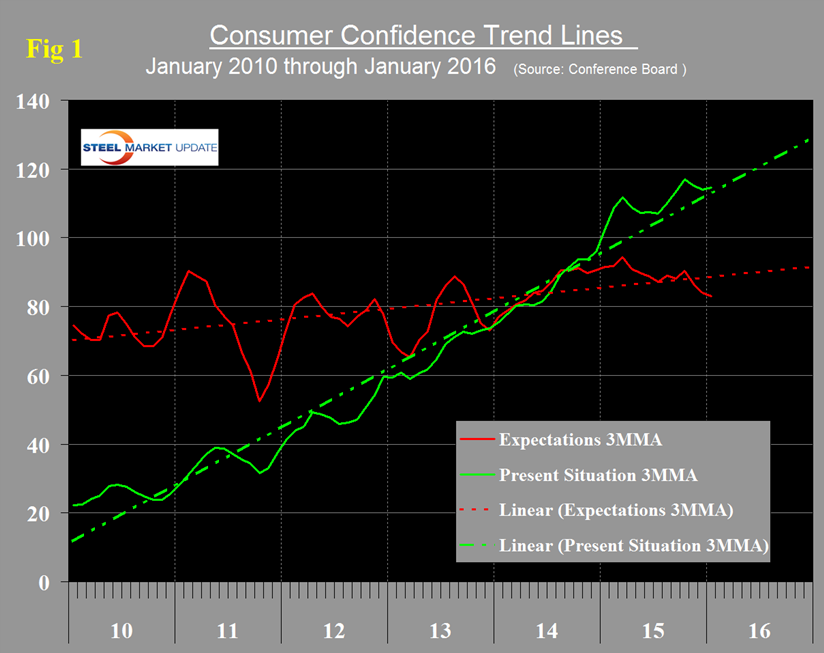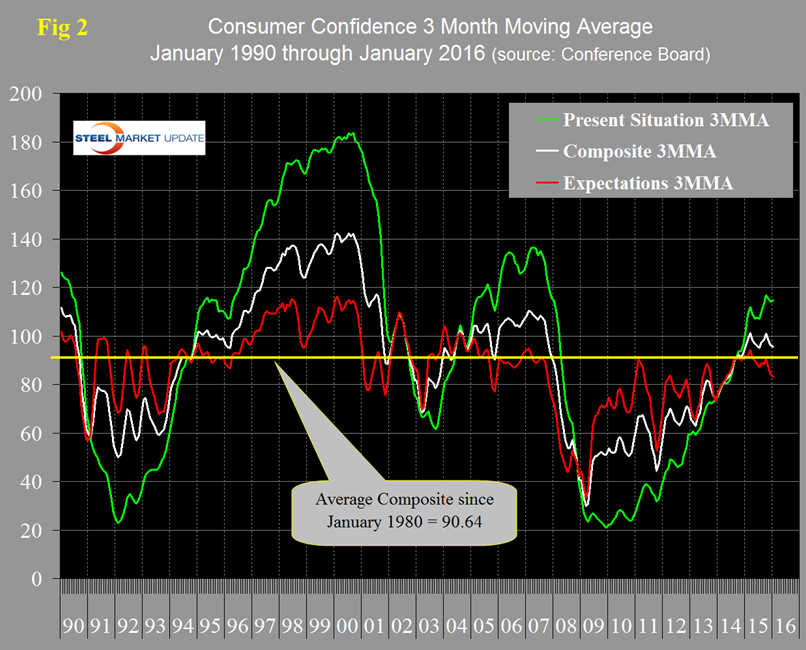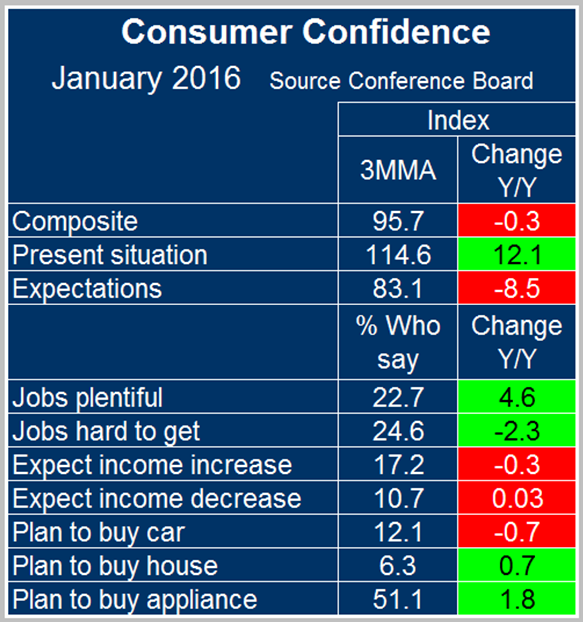Market Data

January 27, 2016
January 2016 Consumer Confidence
Written by Peter Wright
Consumer confidence improved from 96.3 in December to 98.1 in January. The three month moving average (3MMA) declined from 96.0 in December to 95.7 in January. The 3MMA of the present situation is almost on its five year trend and that of expectations has now fallen below its 5 year trend (Figure 1).
The historical pattern of the 3MMA of the composite, the view of the present situation and expectations are shown in Figure 2.
The consistency of the recovery of the composite is looking better than the turn around after the recession in 2003 but has not yet reached the level attained before the great recession. If history repeats itself, the view of the present situation will continue to move ahead and widen the differential between it and expectations. On a year over year basis using a 3MMA, the composite at 95.7 was down by 0.3. This was the first time for the y/y 3MMA of the composite to be down since April 2013. On the same basis, the view of the present situation was up by 12.1 and expectations were down by 8.5 (Table 1).
This is basically a status quo report. The composite consumer confidence index has made no progress in the last 12 months as gains in the present situation component have been countered by declining expectations.
The job availability sub-indexes were both up but the expectations for salary increase were down. This was the first time for income increase expectations to have been down since July. The year over year trend for auto purchase was negative for the sixth straight month. We don’t know what the lead of this component is compared to actual purchases but it doesn’t seem to jive with the exceptional sales result of 2015 as a whole. Plans to buy a house have been positive for eight straight months and plans to buy an appliance became positive after negative reports in November and December. Overall in 2015 through this January 2016 report, the Conference Board index has maintained the strongest value since Q3 2007.
The official news release from the Conference Board reads as follows and is entirely based on monthly changes. It strikes us that the official analysis bears little resemblance to our conclusions as outlined above. Nevertheless this is a highly regarded indicator which we believe needs to be examined in a longer time context to get the real picture. Direction and long term context is everything!
U.S. Consumer Confidence Increased in January, Conference Board Says
Consumers’ confidence rose in January to the highest level since October, indicating that Americans are so far brushing off gyrations in the financial markets.
The Conference Board’s index of consumer confidence, released Tuesday, rose to 98.1 this month from a revised 96.3 in December. Economists surveyed by The Wall Street Journal forecast the index to fall to 96.0. “For now, consumers do not foresee the volatility in financial markets as having a negative impact on the economy,” said Lynn Franco, director of economic indicators at The Conference Board. Those surveyed felt more confident about future economic conditions, with the expectations index increasing to 85.9 in January from 83.0 a month earlier. Meanwhile the current conditions measure was unchanged at 116.4.
Measures of consumers’ feelings are being closely watched for signs that a slide in financial markets is rattling shoppers. With turmoil throughout the global economy, consumers will be relied upon to drive U.S. growth early this year. The confidence index touched a post-recession high of 102.6 in September, before sliding in the fall. The recent increase is in line with the University of Michigan’s preliminary consumer sentiment index, which also rose in January. A final reading of that index is due out on Friday. The Conference Board report showed consumers’ outlook for the labor market was also slightly more optimistic. Those anticipating more jobs in the months ahead increased to 13.2 percent from 12.4 percent, while those anticipating fewer jobs decreased slightly this month. A larger share of consumers also expected their incomes to increase, but the proportion expecting a reduction in income also increased slightly.
About The Conference Board
The Conference Board is a global, independent business membership and research association working in the public interest. Our mission is unique: To provide the world’s leading organizations with the practical knowledge they need to improve their performance and better serve society. The monthly Consumer Confidence Survey®, based on a probability-design random sample, is conducted for The Conference Board by Nielsen, a leading global provider of information and analytics around what consumers buy and watch. The index is based on 1985 = 100. The composite value of consumer confidence combines the view of the present situation and of expectations for the next six months. The Conference Board is a non-advocacy, not-for-profit entity holding 501 (c) (3) tax-exempt status in the United States. www.conference-board.org
(Sources: The Conference Board and SMU Analysis)










